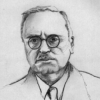Alfred Adler

Alfred Adler
Alfred W. Adlerwas an Austrian medical doctor, psychotherapist, and founder of the school of individual psychology. His emphasis on the importance of feelings of inferiority—the inferiority complex—is recognized as an isolating element which plays a key role in personality development. Alfred Adler considered human beings as an individual whole, therefore he called his psychology "Individual Psychology"...
NationalityAustrian
ProfessionScientist
Date of Birth7 February 1880
CountryAustria
My passions are the grapes that I tread out for mankind.
There are thousands of degrees and variations, but it is always clearly the attitude of a person who finds his superiority in solving the complications of others.
It is easier to fight for our principles than it is to live up to them.
We live upon the contributions of our ancestors. Nature is a good scavenger. She soon gets rid of her rubbish.
You cannot divide the individual, man is a whole human being.
Every thing may be different, even what I say to you now may be different !
Defiant individuals will always persecute others, yet will always consider themselves persecuted.
The widespread belief that Yuppies as a class would perish from Brie-cheese poisoning turned out to be over-optimistic.
Every pampered child becomes a hated child.... There is no greater evil than the pampering of children.
War is organized murder and torture against our brothers.
Each generation has its few great mathematicians, and mathematics would not even notice the absence of the others. They are useful as teachers, and their research harms no one, but it is of no importance at all. A mathematician is great or he is nothing.
It is one of the triumphs of human wit ... to conquer by humility and submissiveness ... to make oneself small in order to appear great ... such ... are often the expedients of the neurotic.
War is not the continuation of politics with different means, it is the greatest mass-crime perpetrated on the community of man.
Every individual acts and suffers in accordance with his peculiar teleology, which has all the inevitability of fate, so long as he does not understand it.